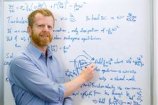Equation-Free function toolbox for Matlab/Octave
Users
Click to download the toolbox via Github, and then place the toolbox's folders Patch and ProjInt in a path searched by Matlab/Octave.This equation-free toolbox empowers the computer-assisted analysis of complex, multiscale systems. Its aim is to enable you to use microscopic simulators to perform system level tasks and analysis, because microscale simulations are often the best available description of a system. The methodology bypasses the derivation of macroscopic evolution equations by computing only short bursts of of the microscale simulator, and often only computing on small patches of the spatial domain. This suite of functions empowers users to start implementing such methods in their own applications. The document eqnFreeUserMan.pdf describes how to use the main functions of interest to you.
[](https://au.mathworks.com/matlabcentral/fileexchange/73632-equation-free-toolbox)
Please contact us via https://profajroberts.github.io

Sparse simulation on only small patches of space
The above graph illustrates an `equation-free' computation on only small well-separated patches of the spatial domain. The micro-scale simulations within each patch, here a nonlinear diffusive system, are craftily coupled to neighbouring patches and thus interact to provide accurate macro-scale predictions over the whole spatial domain. We have proved that the patches may be tiny, and still the scheme makes accurate macro-scale predictions. Thus the computational savings may be enormous, especially when combined with projective integrationProjective Integration skips over time
 Simulation over time is a complementary dynamic problem. The
`equation-free' approach is to simulate for only short
bursts of time, and then to extrapolate over un-simulated
time into the future, or into the past, or perform system
level analysis. This graph plots one example where the gaps
in time show the un-computed times between bursts of
computation.
Simulation over time is a complementary dynamic problem. The
`equation-free' approach is to simulate for only short
bursts of time, and then to extrapolate over un-simulated
time into the future, or into the past, or perform system
level analysis. This graph plots one example where the gaps
in time show the un-computed times between bursts of
computation.
Contributors
This project aims to collectively develop a powerful and flexible Matlab/Octave toolbox of equation-free algorithms. Initially the algorithms are basic, and the ongoing program is developing more and more capability. Doc/eqnFreeDevMan.pdf fully details the function code and many examples. The Appendix outlines how to contribute to the project.By the way: Paul Petersik is also developing some equation-free projective integration, but in python, see https://github.com/pjpetersik/eqnfree
If you like this web page, please link to it so others can find it more easily.


